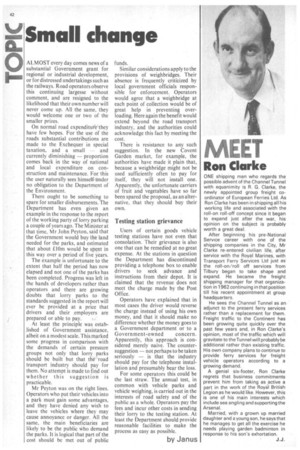Small change
Page 46

If you've noticed an error in this article please click here to report it so we can fix it.
ALMOST every day comes news of a substantial Government grant for regional or industrial development, or for distressed undertakings such as the railways. Road operators observe this continuing largesse without comment, and are resigned to the likelihood that their own number will never come up. All the same, they would welcome one or two of the smaller prizes.
On normal road expenditure they have few hopes. For the use of the roads substantial contributions are made to the Exchequer in special taxation, and a small and currently diminishing — proportion comes back in the way of national and local expenditure on construction and maintenance. For this the user naturally sees himself under no obligation to the Department of the Environment.
There ought to be something to spare for smaller disbursements. The Department has even given an example in the response to the report of the working party of lorry parking a couple of years ago. The Minister at that time, Mr John Peyton, said that the Government would buy the land needed for the parks, and estimated that about £10m would be spent in this way over a period of five years.
The example is unfortunate to the extent that half the period has now elapsed and not one of the parks has been completed. Progress was left in the hands of developers rather than operators and there are growing doubts that lorry parks to the standards suggested in the report will ever be provided at a price that drivers and their .employers are prepared or able to pay.
At least the principle was established of Government assistance, albeit on a modest scale. This marked some progress in comparison with the demands of certain pressure groups not only that lorry parks should be built but that the road transport industry should pay for them. No attempt is made to find out whether this suggestion is practicable.
Mr Peyton was on the right lines. Operators who put their vehicles into a park must gain some advantages, and they have denied any wish to leave the vehicles where they may cause annoyance or danger. All the same, the main beneficiaries are likely to be the public who demand the parks. It is logical that part of the cost should be met out of public funds.
Similar considerations apply to the provisions of weighbridges. Their absence is frequently criticized by local government officials responsible for enforcement. Operators would agree that a weighbridge at each point of collection would be of great help in preventing overloading. Here again the benefit would extend beyond the road transport industry, and the authorities could acknowledge this fact by meeting the cost.
There is resistance to any such suggestion. In the new Covent Garden market, for example, the authorities have made it plain that, because a weighbridge might not be used sufficiently often to pay for itself, they will not install one. Apparently, the unfortunate carriers of fruit and vegetables have so far been spared the proposal, as an alternative, that they should buy their own.
Testing station grievance
Users of certain goods vehicle testing stations have not even that consolation. Their grievance is also one that can be remedied at no great expense. At the stations in question the Department has discontinued providing a telephone box to enable drivers to seek advance and instructions from their depot. It is claimed that the revenue does not meet the charge made by the Post Office.
Operators have explained that in most cases the driver would reverse the charge instead of using his own money, and that it should make no difference whether the money goes to a Government department or to a Government-owned concern. Apparently, this approach is considered merely naive. The countersuggestion — not perhaps to be taken seriously — is that the industry should pay for the telephone installation and presumably bear the loss.
For some operators this could be the last straw. The annual test, in common with vehicle parks and vehicle weighing, is carried out in the interests of road safety and of the public as a whole. Operators pay the fees and incur other costs in sending their lorry to the testing station. At least the Department should provide reasonable facilities to make the process as easy as possible.
by Janus






























































































